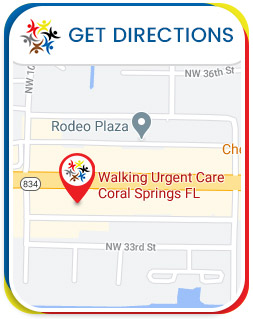Stress Foot Fractures: What You Need to Know
Here’s what you should know about Stress Fracture. For more information, call us or schedule an appointment online. We serve patients from Coral Springs FL, Parkland FL, Tamarac FL, Margate FL, North Lauderdale FL, Coconut Creek FL.


Table of Contents:
What Should You Know About Foot Stress Fractures?
Do Your Symptoms Warrant Treatment?
How Can Urgent Care Treatment Help?
If you seriously hurt your foot during a high-impact workout session but don’t see any clear signs of a broken bone, you may wait to see if the injury heals itself. Even if you don’t see any clear signs of a bone fracture, you still want to see an urgent care doctor soon. You could have a stress fracture somewhere in your foot.
Learning more about stress fractures of the foot can help you determine whether or not urgent care treatment is the best option for you.
High-impact exercises can be great additions to any workout program. However, some exercises or activities can also be extremely stressful on the bones in the lower body, particularly the heel, foot, and ankle bones. Bones that undergo repeated stress can crack. Doctors call these cracks stress fractures.
Stress fractures can occur anywhere in the foot, including in the tarsal bones near your toes and in the small bones in your heels. These bones are weight-bearing bones that help support much of your body weight when you engage in low- and high-impact activities. Weight-bearing bones can weaken if you place tremendous, repeated stress on them.
In addition to overuse and repeated stress, foot bones can break if you already have something wrong with the bones in your body. For instance, adults who have osteoporosis can experience foot fractures over time. If you performed your exercises correctly but still injured your foot, you may be at risk for osteoporosis.
The facts above are just some of the things you should know about for foot fractures. Learning more about the symptoms of stress foot fractures can help you determine whether or not you should see a doctor for care.
Bone injuries that occur in the foot can exhibit a number of signs and symptoms. The most common complaint of many adults who suffer from foot fractures is pain. The pain may be searing and upfront, or it can be subtle and mild. The degree of pain you feel may depend on the location and severity of the fracture.
In addition to pain, the soft tissue in your injured foot might swell with fluid. Redness or bruising may also show up in your skin. Bruising can occur if the blood vessels and tissues around the injured bone break and leak blood under the skin.
Your injury might affect your mobility, or ability to walk or move your foot. Some adults complain of numbness and weakness in their foot. If you’re an active individual who needs to work or care for your family, your injury may make it hard for you to carry out your duties.
If you have any of the problems above, seek urgent care treatment immediately.
An urgent care doctor or team will need to determine how bad your bone fracture is before they treat you. A doctor can do so by taking CT scans of your foot, or they may opt to use X-rays during your visit. Both diagnostic methods allow a physician to determine the location, extent, and severity of your injury.
Once an urgent care doctor knows more about your broken foot, they’ll secure it with a case or another stabilizer. Stabilizing the injury can encourage it to heal quickly and properly. A doctor may use other methods to secure your injured foot as well.
A physician may also give you something for the pain and swelling in your foot. Pain medications can help keep your injury from getting worse. If you can’t take prescription pain medication, tell a doctor immediately. Other pain relief options may be available to you.
You may also need to return to an urgent care center for follow-up care later. Some urgent care centers provide primary care services to visiting patients. If you have the option to see a primary care doctor at an urgent care center, consider doing so.
If you need help diagnosing or treating the severe injury in your foot, contact or visit us at Walking Urgent Clinic for care today.










